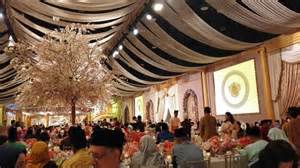Muslim weddings vary depending on the bride and groom’s cultural background (Arab Muslim or South Asian Muslim, for example), there are key elements that tie all of these weddings together.
“Marriage is viewed as a lifelong commitment to each other with the blessings of Allah,” says Devya R. Pillai, wedding coordinator of Breathtaking Moments: Wedding And Events in Toronto. In light of that, the wedding ceremony or the nikkah, is highly valued by practicing Muslims.
During the wedding, Pillai says the bride and groom say qubool (yes), three times for the marriage to be valid. This is done during the nikkah portion of the ceremony. “The nikkah is a very intimate ceremony and is very short in nature,” she says.
Some people also have events leading up to the wedding ceremony and reception, including a henna or mendhi party, where the bride and her family and friends decorate their hands with henna. While traditions can be different for families and cultures, some weddings include men and women sitting separately during the ceremony or reception and at others, the priest may also read the first chapter of the Qu’ran to all guests after the ceremony is complete, according to etiquette site Emily Post.
Here are six things that are common during Muslim weddings:

Muslim weddings can be held at mosques, a place of worship for Islam followers. However, many couples also decide to hold the wedding and reception at banquet halls for space and cost.
The nikkah/nikah is arguably the most important ritual during a Muslim wedding. Here, the bride and groom sign a legal contract that symbolizes an Islamic marriage. “The nikkah is a very intimate ceremony and is very short in nature,” says Devya R. Pillai, wedding coordinator of Breathtaking Moments: Wedding And Events in Toronto.
Sometimes, the couples may choose to do the nikkah in front of a larger audience as well. During this time, the priest or Imam will also recite scriptures from the Qur’an explaining the importance of marriage and the couple’s new roles as husband and wife.
Couples may also decide to exchange rings at this point, or save it for the reception.
The walima refers to second portion of an Islamic wedding or the reception. During the walima, you may see performances, speeches and a gathering of family and friends for a feast.
Almost all guests wear traditional clothing, Pillai says. If you can’t get your hands on an outfit, wear something modest and long sleeved, if possible, especially at the mosque. When in doubt, speak to a family member.
Muslim weddings can be either small or large, depending on the family. Sometimes, the nikkah is attended by close family members, while receptions or dinners can have more than 100 guests.
Muslim weddings can be quite colourful with tones of reds, greens and whites, depending on the bride’s choice and cultural background. At some South Asians Muslim weddings and receptions, for example, you’ll see the bride wear red or blue tones, and at some Arab Muslim weddings, for example, you may see a bride in a white bridal outfit.
References: muslim-wedding





